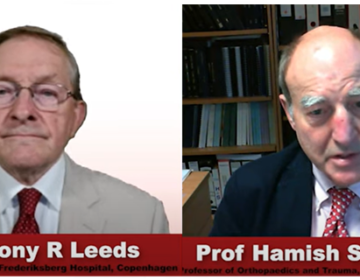Health Chats with Dr.Leeds | Weight loss maintenance | Dr George Thom | EAWAZ TV
Dr George Thom worked on the DiRECT diabetes remission trial in Glasgow and undertook work to address questions relating to why most people struggle to maintain weight lost through dieting regardless of how they lost weight.
In this conversation, Dr Thom describes how weight loss is relatively easy compared to keeping weight off in the years afterwards, and some of the key factors that make it difficult are discussed. Aside from the general environmental challenges of excessive availability of foods and marketing techniques promoting consumption he also considers how the body responds to weight loss. He discusses the hormonal signals that generally operate to drive the body weight back up to its highest level, and the reduction in energy needs of a reduced body weight. He discusses how these factors can be addressed to some extent. Dr Thom also discussed some of the psychological factors which can be difficult to overcome. In particular, he described how weight regain is more likely in people who use food to regulate feelings of stress and low mood, and stressed the importance of finding alternative coping strategies to emotional eating for long term success.
Recent studies have shown that, after a 10% weight loss, those who sleep less than six hours each night regain significantly more weight after 12 months than those who sleep more than six hours each night. It has also been shown that a large weight loss can improve sleep duration and quality. Dr Thom discusses these results and agrees that it could mean that we should talk to people about their sleep as part of a wider plan for weight reduction and weight maintenance, which should also include a specific plan for addressing future weight regain, adding in a physical activity programme, and overcoming the changes in appetite and energy needs which are altered by weight loss.
Simple points of advice about getting good sleep can include:
- Do get to bed at a regular time every night and get up at a regular time;
- Do not eat or watch TV in bed;
- Do limit or avoid all screen use for 1-2 hours before bedtime and especially avoid stimulating computer games;
- Avoid caffeine containing drinks for up to 6 hours before sleep;
- Avoid smoking for at least an hour before going to bed;
- Avoid excessive exercise for a few hours before going to bed;
- Do arrange a warm bed and a cool uncluttered room with low lighting (warm light rather than blue/white light);
- Do write a list of worries and/or a ‘to-do’ list before going to bed.
Web links to useful sources of information are given below.
https://www.rethinkobesity.com/metabolic-adaptation.html
Physiology of weight loss
What are the key principles of obesity management?
For Pakistan:
Obesity: how to prevent Pakistani people from becoming heavier?
–ooOOoo–















